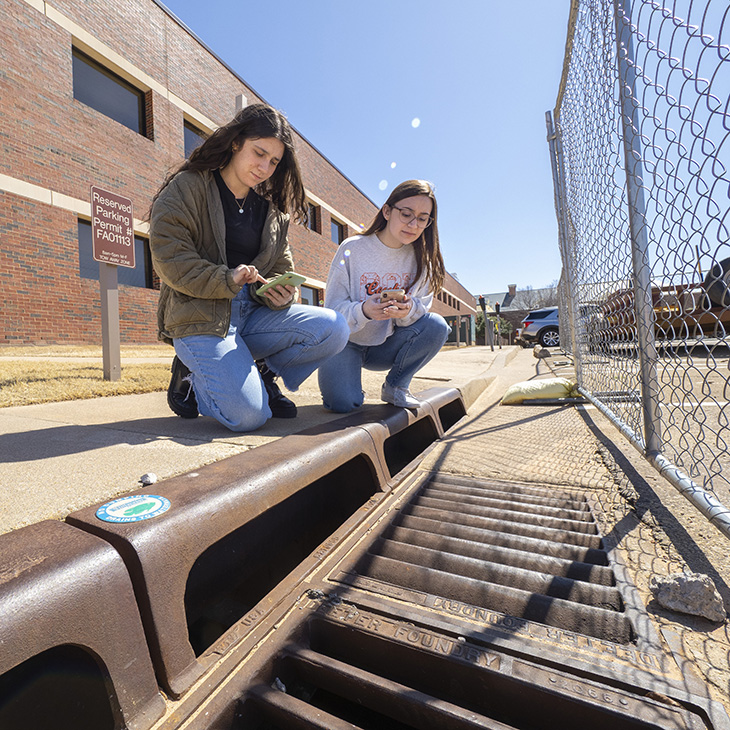
OSU students lead the charge for sustainable practices
Wednesday, August 3, 2022
Media Contact: Mandy Gross | Sr. Manager of Strategic Communications and Special Projects | 404-744-4063 | mandy.gross@okstate.edu
Oklahoma State University strives to promote sustainability efforts, and Ferguson College of Agriculture students are leading the charge to recommend environmental sustainability practices on campus.
Daussin Afonso and Julia Frusciante, OSU environmental science undergraduate students, researched sustainable water drainage systems on campus last spring. They provided recommendations for several locations, including the New Frontiers Agricultural Hall, a state-of-the-art teaching, research and Extension facility for OSU Agriculture.
“We were interested in this project because we saw the need for improvement of water drainage systems on campus,” Afonso said. “We wanted to leave something behind that can be used as a learning tool for students and help keep our campus looking beautiful.”
The duo developed the report as part of a senior capstone course led by Karen Hickman, professor and director of OSU’s environmental science undergraduate program.
With construction for the New Frontiers Agricultural Hall underway, Afonso and Frusciante saw the project as an opportunity to provide student perspectives on areas where sustainable systems can be implemented.
“When students are involved in making suggestions on these types of projects, they tend to move faster,” Frusciante said. “As students, we know what we want to see more of on campus, and OSU listens.”
Afonso and Frusciante worked with Randy Raper, assistant vice president of facilities for OSU Agriculture, on sustainability plans for the New Frontiers Agricultural Hall.
Raper said a rainwater catchment system was proposed as an alternate add-on, but it was not included in the base plan due to budget constraints for the New Frontiers project.
“We would like to implement a rainwater catchment system for teaching and research purposes,” he said. “The proposed plan includes an outdoor cistern located on the backside of the building to catch rainwater. However, we won’t be able to move forward with a rainwater catchment system until we have an entity that’s focused on funding that aspect.”
Combining creativity and knowledge, the students suggested additional rainwater catchment system plans to incorporate in the new building, including a rain garden, green roof and using permeable paving methods for the brick-paved walkways.
The students found rain gardens provide many environmental, economic and aesthetic benefits by capturing water from rooftops, driveways and sidewalks.
“There are already plans in place for landscaping, but we really would like to see rain gardens implemented,” Frusciante said. “We hope the idea can be revisited once construction is complete.”
The students said adding a green roof can help lower energy and roof maintenance costs. A green roof system is an extension of the existing roof, which involves high-quality waterproofing, root repellent and drainage systems, a filter cloth and lightweight growing medium, and plants.
Although plans for brick-paved walkways are in place, the students said using permeable paving methods allows stormwater to infiltrate through the surface of the pavement to the ground below, reducing the amount of runoff.
“We want our campus to look its best,” Afonso said. “These practices can help minimize problems as well as keep our campus beautiful.”
Other sustainable practices have been incorporated during the construction process.
“The gravel that was used to cover the many truckloads of fill dumped on the building site was recycled from the parking lot and from Ag North that was removed to make room for the footprint of the new facility,” Raper said. “The construction crew will continue to recycle construction and demolition debris when available.”
Hickman said while OSU works toward a more sustainable campus, having these practices implemented in the New Frontiers Agricultural Hall is a great learning opportunity for students and faculty in the Ferguson College of Agriculture.
“I think long-term planning at OSU is recognizing all the environmental issues and implementing sustainable practices that don’t cost that much more,” Hickman said. “By implementing these sustainable practices, we aren’t inventing anything new, we are just using practices that have always been around and are absolutely beautiful.”
As a faculty mentor and teacher of the capstone and planning course, Hickman is responsible for guiding and directing the students to the finished product. When students present ideas with background information, they learn to be leaders in sustainability and environmental projects.
“As an agricultural college, we should strive to be leaders in sustainability,” Frusciante said. “The New Frontiers Agricultural Hall should be the greenest building on campus.”
Afonso and Frusciante both graduated from OSU in May 2022 with environmental science bachelor’s degrees and went on to begin their careers.
Afonso, from Choctaw, moved to Austin, Texas, to work as a junior environmental scientist for APTIM, a global provider of integrated services. Frusciante landed a job in her hometown of Tulsa as a soil conservationist for the U.S. Department of Agriculture-Natural Resources Conservation Service.
The New Frontiers campaign was launched in January 2020 to build a new state-of-the-art facility for OSU Agriculture. The New Frontiers Agricultural Hall, expected to open in fall 2024, further advances teaching, research and Extension efforts that are critical to the state’s economy, citizens’ safety and quality of life. By advancing OSU Agriculture and its programs, New Frontiers is fostering innovation to help feed the world.
Story By: Alyssa Hardaway | alyssa.hardaway@okstate.edu
